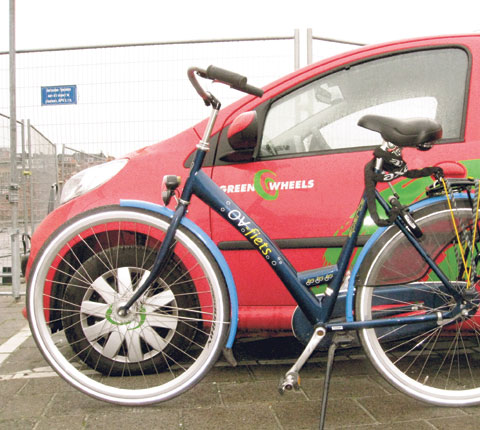Many things are designed for everyday use. Some you fall in love with, others drive you up the wall.
Today’s topic is sharing wheels. And with sharing wheels I don’t mean borrowing somebody’s bike or car, or taking a bus or train.
Nor do I mean common car or bike rental places, which are far too inconvenient and expensive for an afternoon trip to the beach. No, I mean a Shared Wheels system that is easy to use, has many convenient pick-up locations, and is reliable and cheap.
A utopian plan for Shared Wheels was proposed in the 1960s. The plan was to put 2,000 white-colored bicycles for free use on the streets of Amsterdam. The project was never adopted by the city council, however, although a similar project has been successfully implemented in ‘De Hoge Veluwe’ national park, where today you can indeed find lots of free white bikes for general use.
In recent years, several cities, including Paris, have implemented a system of shared bicycles, many with a distinguishingly funny look to them. Although some are reportedly free, most require payment or a membership card to check out a bicycle. The system in Paris is having major problems with vandalized and stolen bikes (they show up as souvenirs in many European cities). Another problem that Paris suffers from is gravity: since you can return a bicycle to any check-out centre, the bikes have a tendency to accumulate at the centres located at the bottom of city’s hills.
In Holland we have two very successful Sharing Wheels projects: one for bikes and one for cars. They both require you to be a member and both have attractive features: picking up the bikes or cars is exceedingly quick and easy; there are quite a few pick-up locations (more so for cars); they’re cheap (well, at least the bicycles), and the ‘wheels’ are well-maintained. The cars need to be returned to the pick-up location; bikes may be returned to other locations, although then the price is steeper, equivalent to a three-day rental. For both the bicycles and the cars you get a discount if you also have a train pass.
The bicycle project is called OV fiets (OV the acronym for Dutch public transport; ‘fiets’ means bicycle). For €9.50 a year you become a member and receive a card with a barcode. Many OV fiets centres are located at the bicycle shops of railway stations. All you need to do is have the barcode of your card and the OV fiets scanned, and off you go. And here comes the best part: you pay only €2.85 for 20 hours! So you can go to a friend’s place, stay over night, and bike back the next day for less than 3 euro. Amazing. And even better: when you’re traveling with others, you can check out two bicycles on one membership card.
The car project is called Green-wheels, and it offers two kinds of cars: the small but fuel-efficient Peugeot 107, and, for a bit more money, the Peugeot 207 station wagon. All cars are red with a green smudge on the wheels. The cars are located at reserved parking spots throughout many Dutch cities. There are 16 pick-up locations in Delft, including one right behind the EWI faculty building. Once you’re a member, you can reserve a car on the Internet. At your reserved time, you go to the car, hold your membership card in front of the windshield, and the locks magically pop open! You then get the keys from the glove compartment, type in your secret pass code and off you go. Greenwheels offers several pricing schemes, depending on how often you want to use a car. Monthly fees vary from 5 to 25 euro. You need to be at least 24 years old, but you can share the membership among three drivers living in the same house. You pay for the car by the hour (2.40 to 6 euro – more expensive on weekends), and by the kilometer (20 to 35 cents). So, for example, a 6-hour trip to the theater in Amsterdam may cost as little as 40 euro on a weeknight. Greenwheels are reasonably priced for shorter trips, but may get somewhat expensive if you go farther or stay longer. For a weekend get-away it’s better to hop a train and grab an OV fiets. For less than 10 euro you can bike anywhere you want, all weekend long.
Mark Bakker is an associate professor at the Faculty of Civil Engineering & Geosciences.
Wil jij in een redactie van studenten één nummer van Delta maken? Een universiteitskrant die jij als student meteen zou willen lezen? Je bepaalt zelf de inhoud, schrijft artikelen binnen de bestaande opmaak en lay-out en maakt foto’s. De krant, Delta 18, zal verschijnen op 28 mei. Op 23 april is de eerste redactievergadering. De redactie van Delta biedt tijdens het hele proces ondersteuning. Met dit project wil Delta erachter komen wat studenten missen in de krant. De afdeling Marketing en Communicatie wil daarnaast meer zicht krijgen op de manieren waarop studenten van alle faculteiten met elkaar zouden willen communiceren. En jij maakt de ultieme krant voor en door studenten, niet minder dan een collectors item. Doe je mee?
Stuur je cv en motivatie naar Saskia Bonger, s.m.bonger@tudelft.nl



Comments are closed.